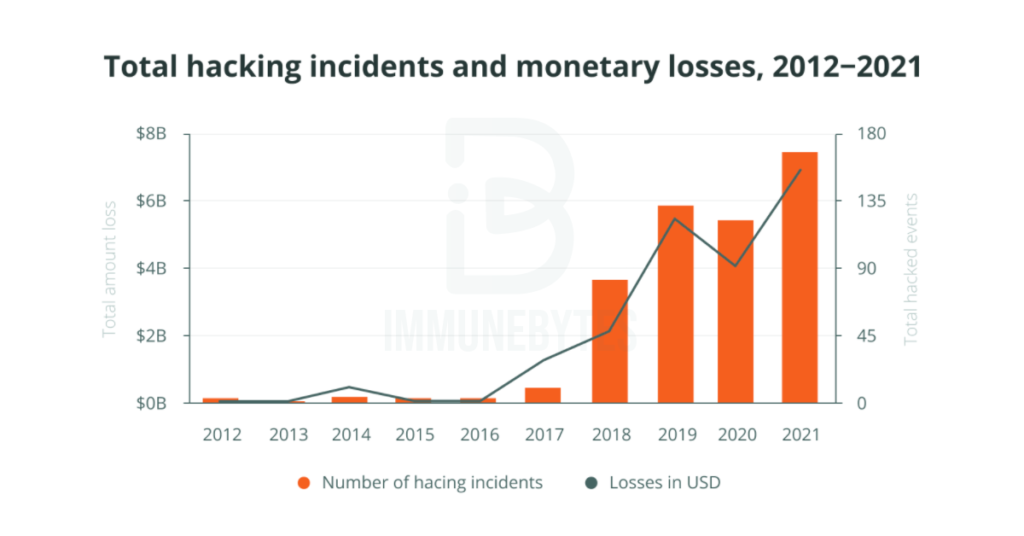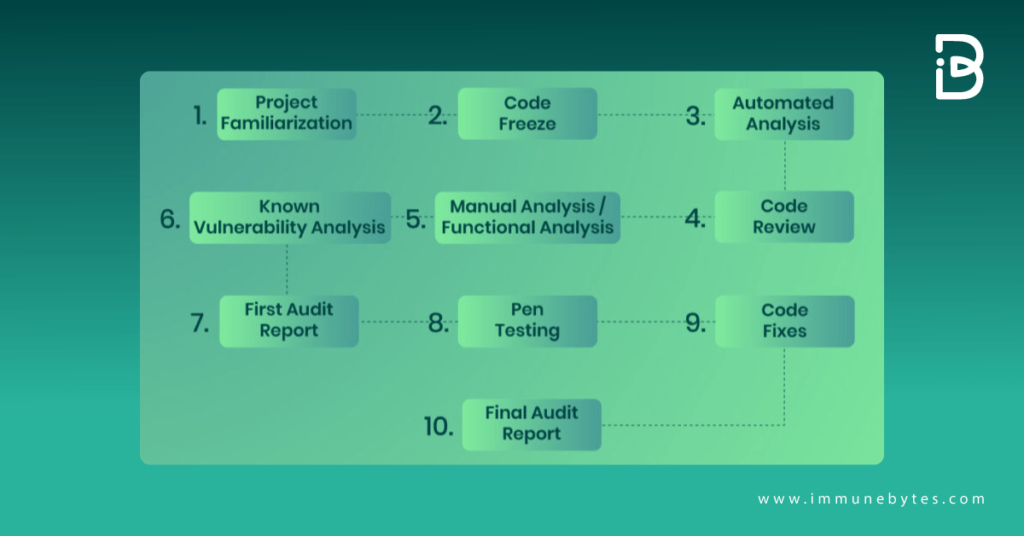The world of blockchain security can be confusing, especially when there are so many lingering myths and false beliefs regarding it. Blockchain sure is the most secure technology out there but, yes there’s a BUT! Blockchain is not unhackable!
We’ve all come across many such headlines when it comes to blockchain and decentralized finance. Does it mean the technology is a failure? Obviously not! If anything, it is the future!
Then why do these hacks happen to once what was hailed as unhackable?
Well, they happen because of the poor security measures employed by the organizations or overlooked vulnerabilities in the codebase of a smart contract upon which the DeFi application operates. And surely, a computer program is pretty easy to hack. Companies often overlook the security channels guarding a project and pour all their efforts into making it user-friendly and whatnot.
Take a look at this graph, representing the monetary losses to hacking between 2012 to 2021.

The numbers only seem to be rising! With a whopping $7 billion+ worth of assets lost in 2021 alone to DeFi and blockchain hacks and thefts, it is high time this community starts taking security seriously.
Ah, that got scary real quick!
Rest assured, we’re not here to only scare you but also to help you out.
Securing blockchain and DeFi can look like a tough task from afar but it’s not really difficult. You just have to find the right people and trustworthy companies that will do it for you!
Here are the options we’re going to be talking about in today’s blog.
We’re going to be discussing all three in detail and by the end of this blog, you’ll be able to decide for yourself! So let’s go.
Smart Contract Audits
Table of Contents

To get your smart contracts audited is a given. No ifs, no buts. If you want to stay away from losing millions of dollars, audits are the first step.
So what is a smart contract audit? A smart contract audit is an extensive methodical examination and analysis of a smart contract’s code that is used to interact with a cryptocurrency or blockchain. This process is conducted to discover errors, issues, and security vulnerabilities in the code in order to suggest improvements and ways to fix them.
Audits can be done by your own development team or you could even hire a third-party security firm to do it for you. We would recommend hiring a third-party company as they’re skilled and specialized in doing just that. It would also give you an outsider’s perspective of your project.
Now, why are audits important? Smart contracts often interact with each other, and any integrations with third-party systems can also result in making the system vulnerable. Because of this, a thorough check of the system is critical. These checks are often expanded to other smart contracts involved in any interactions, and even those that the ones it interacts with are interacting with. Such checks usually include both running tests and manual code analysis.
The recommendations made by the auditors are conveyed in advance to the project team, and their actions in response are noted in the final report. It is considered a mark of authenticity and integrity for the project.
Audits can win user confidence and raise the project’s credibility. These audits are typically carried out in several steps, the roadmap of which you can see below.

You can read in-depth about how an audit is carried out in this blog.
Benefits of a Smart Contract Audit
- Helps to detect uneven and unexpected vulnerabilities before project deployment and therefore, prevent hacks.
- Ensures that the code behaves as intended, under every given circumstance.
- Covers four major dimensions of users? privacy? defense of private key architecture security, business logic, data maintenance, and infrastructure.
- Better optimization and improved performance of smart contracts.
- Acts as a stamp of authenticity and integrity of a project.
To keep in mind: Factors affecting an audit’s efficiency
- Communication between the project team and the audit team.
- The tool used to carry out the automated analysis during the audit.
- The complexity of the codebase and familiarity with the programming language used.
Regardless of what level of the stack you’re working on, smart contract security must be a top priority for those interested in securing the future of DeFi.
For any audit assistance, reach out to us at ImmuneBytes.
Bug Bounty Programs

Coming to bug bounties. As the industry embraces technological advancements, cybercriminals grow more and more sophisticated in their ways, making it even harder to prevent them from playing their game.
That’s where bug bounties act as knights in shining armor for an organization! A bug bounty program allows organizations to leverage the hacker community to help find and disclose vulnerabilities in exchange for payment.
Simply put, A bug bounty program is an event where ethical hackers help businesses detect vulnerabilities before the bad guys beat them to it.
A bug bounty for smart contracts is not that different from a typical bug bounty for a web application. Every application has vulnerabilities, and smart contracts are no exception. In order to be, say, a Solidity smart contract bug hunter, if the smart contract is developed in Solidity, you need to possess the skill sets of a Solidity developer and an application security engineer.
The 2 paramount skills you require to hunt bugs are: Understanding the code and finding and exploiting vulnerabilities in it.
Benefits of a Bug Bounty Program
- More eyes looking for weaknesses, more people with different skill sets and techniques, and researchers with different levels of experience.
- Can be significantly cheaper, depending on how much money you want to put at stake.
- Customization. You get to decide the parameters of the tests and specify what areas of the application are off-limits and more.
- Scalable in the sense that, you don’t pay for duplicates of the same bug, and depending on how important the vulnerability is you can decide how much you pay them.
- Provides the flexibility that many organizations need to meet their testing needs without exhausting their resources.
To keep in mind: Factors affecting a bounty’s efficiency
- The platform with which you’re partnering up to launch your bug bounty, how authentic they are.
- Scope of your bounty program. You must have unquestionable clarity about the authorized conduct framework.
- The type of bounty program: public or private.
But all in all, bug bounty programs’ benefits significantly outweigh their challenges. Bug bounties are one of the ways to help keep organizations out of those headlines and continue on the path to a safer digital life.
And to answer the elephant in the room, bounty programs combined with audits are a safer option, one that we recommend to our clients. Crowdsourced bug-bounty programs make more sense after security audits, otherwise, they’re expensive and quite honestly, ineffective.
Decentralized Insurance Offerings

Firstly, what are decentralized insurance offerings? It is nothing but a decentralized alternative to insurance. Blockchain technology is used to create a risk-sharing pool in the form of a mutual to return the power of insurance to the people.
Such offerings allow anyone to become a member and purchase cover. It replaces the idea of a traditional insurance company because its members wholly own it. The model encourages engagement as members will get economic incentives for participating in risk assessment, claims assessment, and governance.
Now, some people might argue that this concept cancels out everything we discussed above but that’s definitely not the case.
Formal verification techniques allow us to prove that code works precisely per the specifications, which is a fantastic help, but there is always some gap. We still have to write the specifications correctly and convert the intentions of humans into cold hard code.
We believe that this community would benefit from another safety net. An assurance that gives users more confidence that their funds won’t be lost due to bugs while also allowing developers to deploy contracts with greater confidence. The main aim behind smart contract covers is to launch a mutual risk-sharing entity, run entirely on the public chain that allows users to share a critical risk.
Benefits of a smart contract insurance
- The risk is shared among multiple users, the more users, the lesser the losses.
- Acts as a safety net on top of all other employed security measures.
- Community-driven, without any centralized party having a hold over rulemaking. Hence, a greater degree of trust among users.
- Stabilizes the disturbance in the DeFi space by instilling trust and confidence between users and their protocols
To keep in mind: Factors affecting an insurance’s efficiency
- First and foremost, the organization and its authenticity.
- The base price of your cover. This is based on how battle-tested your code is. For example, how long the smart contract has been on the main net with funds exposed to being hacked?
Decentralized insurances are nothing but a smart upgrade to your traditional insurance. It is always wise to have an extra layer of security, guarding your system. The right measures, such as audits and bounty programs, make your system foolproof and resistant to hackers.
Concluding Thoughts
All this discussion has led us to the conclusion that securing a blockchain or decentralized application is not impossible. It only requires smart decision-making capabilities, where one must know the ins and outs of the system and should be able to understand their project needs.
As critical and efficient as these measures may be, one must put thorough care and focus while developing the application and even during the maintenance phase. These measures when employed will only work on the initial codebase and make it stronger and more rigorous.
We’ve laid out the options in front of you, it’s you who has to decide what your project requires!
About Us
ImmuneBytes is a Blockchain security audit firm that employs the industry’s best tools and practices to provide a comprehensive smart contract audit service. We have a team of robust and experienced security professionals who are adept at their niches and provide you with quality service. We have worked on 165+ projects spread across the world on different Blockchain frameworks with some of the industry’s top firms and we continue to unfold the decentralized movement.
We are also providing consultancy, coming up with a bug bounty platform, and also an insurance product to provide our clients with a hassle-free security product catalog. Stay tuned.
Additional Resources
- WHAT SMART CONTRACT AUDIT CAN DO FOR YOUR BUSINESS?
- ALL ABOUT SMART CONTRACT BUGS & SECURITY ? A CAKEWALK SERIES
- SMART CONTRACT INSURANCE ? AN ALTERNATIVE TO SECURE FUNDS
- AUDITING AN EOS SMART CONTRACT: HOW TO?
- TRON SMART CONTRACT AUDIT: HOW TO?
- GOT YOUR SMART CONTRACT AUDITED? HERE’S WHAT TO DO NEXT
- PARALLEL PROCESSING IN SMART CONTRACTS: WHY IS IT IMPORTANT?
- EFFECTIVE, USABLE, AND FAST: ECHIDNA, A SMART CONTRACT FUZZING TOOL

